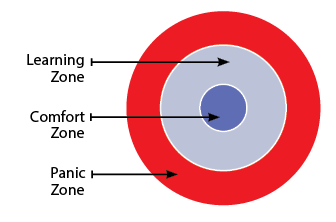Making decisions is a part of life. Growing means you have to test your comfort zone. You can do this by empowering yourself with knowledge, desire, and the necessary skills to expand your perceived limits.
To be an effective counselor in 2020, you must be able to evaluate the social environment, manage a host of camper situations, and develop the appropriate personal skills to expand your existing comfort zone. All staff come to camp with predetermined limits of personal boundaries and emotional barriers. This creates a spectrum of ability, from those who willingly embrace challenges to staff who avoid most risky social situations. Most camps have a few talented people who seem to transcend circumstances because they have a way of knowing what to say in moments of uncertainty, but they are in the minority.
Through life experience, each of you has an idea of what you will and will not try in any given situation. When leadership action is required and you need to create a plan or demonstrate a skill, how will prior experience guide you in new situations? How do you know when to challenge your comfort zone?
Any decision you make will come with an expected level of stress or pressure. The depth of your comfort zone, or your ability to feel secure and unchallenged, depends on how you process decisions. Your comfort zone is the safe place where you know what works for you, allowing your personality traits to support your methods of finding answers. Everyone has their own comfort zone — a psychological/emotional/behavioral construct that defines the routine of our daily lives. It describes the patterned world of our existence, keeps us relatively comfortable and calm, and helps us stay emotionally even, free from anxiety and worry to a great degree (Brenner, 2015).
Camp life is hard! It takes constant energy to keep track of campers, activities, and schedules. All day long you must make decisions, and sometimes staying in your comfort zone makes sense because it saves time or promotes a healthy routine. It is also appropriate when you first master a skill and need time to get used to doing things a certain way or when camper safety demands that you follow a prudent course of action.
The downside of staying in your comfort zone is that it challenges neither your ability nor your determination to accomplish something new. Some staff will choose not to expand their comfort zones out of fear of failure, looking silly, criticism, pain, uncertainty, etc. In deciding how much or little you want to expand your comfort zone, remember, this progression is exactly the same process you want your campers to try!
Camp provides many ways for campers to grow, and one of the most powerful tools you have is modeling appropriate behavior. It is very insightful for campers to see you learning things for the first time or asking questions about how to do something, because it promotes a healthy way to solve problems by challenging yourself in a controlled environment.
Stanford psychology professor Carol Dweck, PhD, in her research on fixed versus growth mindset, has found that students who have a growth mindset achieve more in terms of grades, test scores, and the desire to go to college. She states that mindset is people’s belief about basic abilities and talents. People with a fixed mindset believe their basic abilities are traits that they have from the beginning and they only possess a certain amount. Those who support growth mindset think individuals can develop their talents and abilities over time (Dweck, 2018).
What can a growth mindset do for you? It fosters a desire to learn and embrace change while finding inspiration in the success of others. It allows you to learn from constructive criticism and see effort as a path to skill mastery. When you work on developing these traits, you will learn to persist in the face of setbacks instead of staying in your safe place.
So, what happens if you decide not to come out of your comfort zone? Why would you intentionally risk your safe space by taking chances in front of campers or other staff? The answer to these questions lies in the power of personal change.
Getting out of your comfort zone actually creates good stress. It helps you to focus on dealing with the pace of camp, being creative, developing skills, and increasing social interaction. The payoff for expanding your comfort zone is having additional potential responses to life pressures when unexpended circumstances arise.
Here’s a diagram to help you understand how situational reactions are processed.

At the center of the diagram is your comfort zone. It is a safe and secure place that is unchallenged and stable. Decisions here are easy and often routine. The learning or growth zone is where risk-taking occurs. Issues or actions are tested by perceived threat. They can be personal, environmental, or physical in origin, but this zone is where you learn how to respond. The panic zone is a sort of fight or flight mode in which no learning is taking place because you are exhausted, afraid, or overwhelmed. It is a state of terror and uncontrolled anxiety.
The panic zone is not productive. Try to not spend too much time here, because your decision-making abilities may be compromised. The stress of daily camp life produces a wide range of challenges, and eventually you will end up experiencing short visits to this zone. Fortunately for you, the periods of anxiety will decrease with the addition of knowledge and situational awareness. Your goal is to minimize time in the panic zone and increase time in the learning zone.
The structure of camp will help you to expand your comfort zone. Because each person has different tolerance parameters, there is no one formula for getting you safely out of your comfort zone. You should find a mentor and intentionally work with that person to identify areas of personal or social development you need help with during program time, downtime, mealtime, or any time that allows you to safely try new growth strategies.
Here are some benefits for getting out of your comfort zone:
- Just beyond your comfort zone is your real self. Remember, your life is made up of all the experiences you have had, not just those you categorize as safe.
- Taking risks makes it possible to grow. The camp experience is not just for campers. It is designed to help you develop different aspects of your personality, skill set, and decision-making ability.
- Challenging yourself within the safe confines of camp will help you to identify undiscovered talents and abilities.
- It helps you to recognize that some campers are struggling to define their comfort zones. To avoid a stalemate in group or personal development, take small steps to promote the action needed for situational success. Do not settle for mediocre because it’s safe.
- While you are pushing yourself past your perceived limits, expect a little struggle as you master a new skill. Do not get too frustrated, and know you are making positive change.
- Ask to do something new; venture into the unknown. This is where the impossible becomes possible. It is the payoff for spending time in the learning zone. You get to create your own version of who you become.
Without the skill and courage to take action, significant growth opportunities can be missed. Michael Jordan said, “I have failed over and over and over again, and that is why I succeed” (Robert Goldman, 1998).
When you feel yourself struggling to push your limits, take a minute to do a quick inventory of excuses you make to avoid situations. Then ask yourself if your reasons are legitimate. If a fellow counselor offered the same excuse to the same situation, how would you react? While there are no easy answers, it is important to determine what your motivation is for being at camp and how your reactions are affecting possible outcomes.
It takes courage to advance yourself as a developing staff member. Regardless of what your comfort zone consists of, you need to be prepared to face situations that cause a little discomfort or even pronounced stress. Remember, you are promoting life skills through community living, so look at your default behaviors and determine where you can make a difference. For example, refusing to step out of your comfort zone to set and maintain appropriate group limits means it’s likely you will soon lose your campers’ respect.
Regardless of your personal comfort zone parameters, you can successfully meet and exceed camp expectations by doing these 10 things:
- Be on time (or early) for work.
- Be ready to work (work ethic).
- Give effort (even if it’s outside your comfort zone).
- Demonstrate engaged body language.
- Approach each day with consistent energy.
- Display a positive attitude.
- Develop a passion for camp life.
- Be an active listener.
- Do extra whether you’re asked or not.
- Be prepared to put campers first.
Your ultimate goal is to take something out of your panic zone and put it in the learning zone. This will increase your personal growth and decrease things that bother you. Transformation will happen as you gain skills and confidence. Try to combine something you know with an aspect of what is causing you to panic. Work on it in small steps until you no longer feel distressed. You may surprise yourself by being able to positively affect circumstances that used to cause you anxious moments.
Consider the following situations:
1. Your group arrives at a high element on the ropes course and Steve, one of your co-counselors, does not want to step off the ground. In fact, he uncharacteristically breaks down and decides not to participate without even trying. He typically tries everything along with the campers, but his inability to help on this initiative is affecting some of the campers’ desire to get in a harness.
Given the information you just learned, what strategies would you use to work with Steve?
2. Sue is walking across camp to meet her group at dance. Along the way she runs into her friend Tina. While they are walking, Sue admits she likes camp but is not sure if her campers like her. When Tina asks some follow-up questions, Sue describes herself as shy and not much of a risk-taker. She feels her lack of initiative often holds the group back from reaching their potential.
What do you think is the origin of Sue’s concerns, and how would you work with her to improve the situation?
3. You are in the dining hall finishing breakfast when Jason, a co-counselor, expresses he is dreading being in charge of today’s special event. It starts in an hour and he does not feel confident because it is his first time leading the event.
Given the short time frame, what advice or action can you give Jason that might help him be successful?
Deciding to work at camp is a big commitment. To be an effective leader in multiple situations, you need to understand how your comfort zone affects your ability to make decisions. While staying in your comfort zone is safe, it does not allow for healthy risk-taking that can turn into leadership opportunities for growth-minded staff. If you understand comfort zone levels, know the benefits of being in the learning zone, and use the success criteria as a framework for expanding your comfort zone, you will be a very valuable addition to your camp staff.
References
- Brenner, A. (2015). 5 Benefits of Stepping Outside Your Comfort Zone. Psychology Today, 1,2.
- Dweck, D. C. (2018, June 14). The Science of Success Podcast. Retrieved from successpodcast.com/blog/2018/6/14/this-one-sentance-could-change-your-entire-life
- Library, C. (2019, August 17). American Generation Fast Facts. Retrieved from CNN US: cnn.com/2013/11/06/us/baby-boomer-generation-fast-facts/index.html
- Robert Goldman, S. P. (1998). “Nike Culture: The Sign of the Swoosh”. Thousand Oaks: SAGE Publications.
Greg Cronin, MPA, CCD, of GC Training Solutions, is a certified camp director, former ACA National Board Member, 29-year ACA section board member, and author. With more than 35 years of staff training experience, he works with camps, schools, churches, and businesses nationwide. To book Greg for staff trainings or to get more information on his catalog of 50+camp workshops, please contact Greg at [email protected].



